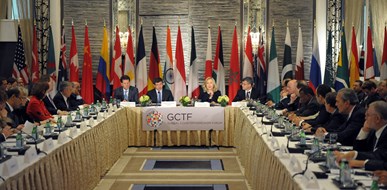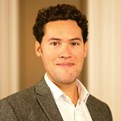[Interview] Asser researcher Tarik Gherbaoui: ‘With my research I aim to reach the decision-makers in the field of counter-terrorism’
Published 11 July 2022By Diva Estanto and Alexander Rijpma

@U.S. Department of State. The official launch of the Global Counterterrorism Forum in New York on September 22, 2011.
Tarik Gherbaoui is a researcher at the T.M.C. Asser Instituut, where he works on various projects in the context of the Institute’s work for the Global Counterterrorism Forum (GCTF). He is also one of the coordinators and speakers for our upcoming advanced summer programme ‘terrorism, counter-terrorism and the rule of law’, organised together with the International Centre for Counter-Terrorism. ‘It is my ambition to increase public understanding of why the rule of law and human rights are an essential part of counterterrorism efforts.’ An interview.
What is the research project you are working on?
‘I defended my PhD thesis back in December 2021. My doctoral work concerned the flow of foreign fighters to the armed conflict in Syria and Iraq. Essentially, I assessed legal responses to foreign fighters at the international, European, and domestic level from the perspective of the rule of law and human rights. I analysed at responses by the United Nations and the European Union and I also did country studies on both the United Kingdom and the Netherlands.
In addition to my research on foreign fighters, which I aim to turn into a book this year, I have started a new research project on countering terrorism in the digital realm, and the increasingly pertinent issue of ‘online terrorist content’. Because terrorists increasingly operate online, counter-terrorism efforts also have increasingly moved into the digital realm. Online efforts raise similar issues as offline counterterrorism operations, but also issues that are unique to the online environment, most prominently in the area of freedom of expression.’
What is the goal of your research?
‘It is my ambition to increase public understanding of why the rule of law and human rights are such an essential part of counter-terrorism efforts. Outside the academic world, there are many politicians, legal practitioners, and policymakers who work in the field of counter-terrorism but find it hard to access academic expertise in the field. There sometimes seems to be a discrepancy between academic writing and counter-terrorism efforts in the real world. With my research I aim to reach the decision-makers in the field. I wish to reach people who can actually use my research in their day-to-day work, or at least to have their day to-day-to-day work informed by my research. The Asser Institute is such an outstanding place for this type of research, as the Institute has always worked in close contact with policymakers and legal practitioners in The Hague and far beyond. Working at the Asser Institute helps me to further disseminate my research and to ensure it has practical as well as academic impact.’
Why did you decide to study international and European law?
‘I think that my decision to specialise in international law, was influenced by my international upbringing, and the international outlook on life that I developed because of it. I was born in Amsterdam but I’m partly of Algerian descent. After finishing secondary school in the Netherlands, I lived in Rome and learned Italian. I also did an Erasmus exchange in Copenhagen and spent several months in Salamanca, Spain to learn Spanish. International law was my favourite module during my undergraduate studies in Amsterdam and I continued my legal studies reading for a Master of Laws degree at the University of Cambridge, again specialising in international law. Although I also enjoyed delving into Dutch law, I have always kept an eye on the wider world.’
Could you tell us about your work prior to joining the Asser Instituut?
‘I did my PhD in international law at the European University Institute in Florence, under the supervision of Professor Martin Scheinin. More recently, I participated in the excellent ‘re:constitution’ fellowship programme of the Forum Transregionale Studien in Berlin, which enabled me to conduct research in different European countries on citizenship deprivation in the counterterrorism context. Before embarking on my PhD, I did a whole lot of different things unrelated to academia. I worked short stints in diplomacy at the Dutch Embassy to Serbia and to Montenegro and at the European External Action Service (EEAS) in Brussels. My very first professional experience in the world of international law was with a Defence Team at the International Criminal Tribunal for the former Yugoslavia in The Hague, a stone’s throw away from the Asser Institute.’
What is your advice to young academics or legal scholars who want to go into this field?
‘In my experience, excellent writing skills are still extremely valued in the world of international law and diplomacy. Nowadays a great many people have multiple degrees from good universities and speak several languages. Yet solid legal writing skills are essential for careers in international organisations and international courts and tribunals. Having solid writing skills is also a prerequisite for an academic career in the field of international law. Even if the English language has become essential in any international professional environment, international organisations and international courts very much value languages other than English. Most jobs in Brussels require French. Knowledge of French, Spanish, Arabic and Russian is often essential to work in the field for international organisations such as the UN and the OSCE. With so many online learning tools available, I would encourage people starting out in the field to develop their language skills, and in particular writing skills, wherever possible.’
About Tarik Gherbaoui Dr Tarik Gherbaoui is a researcher in international law at the T.M.C. Asser Instituut within the research strand ‘In the public interest: accountability of the state and the prosecution of crimes’ where he contributes to various projects in the context of the Global Counterterrorism Forum (GCTF). Tarik holds a PhD in Law from the European University Institute, a Master of Laws degree from University of Cambridge (Sidney Sussex College), and a Bachelor of Laws degree from the University of Amsterdam. He also serves as a senior editor of the European Journal of Legal Studies.
Dr Tarik Gherbaoui is a researcher in international law at the T.M.C. Asser Instituut within the research strand ‘In the public interest: accountability of the state and the prosecution of crimes’ where he contributes to various projects in the context of the Global Counterterrorism Forum (GCTF). Tarik holds a PhD in Law from the European University Institute, a Master of Laws degree from University of Cambridge (Sidney Sussex College), and a Bachelor of Laws degree from the University of Amsterdam. He also serves as a senior editor of the European Journal of Legal Studies.
Advance your knowledge on counter-terrorism and the rule of law
From August 29 – September 2, 2022, the T.M.C. Asser Instituut and International Centre for Counter-Terrorism will host the twelfth Advanced summer programme on terrorism, counter-terrorism and the rule of law. In this thought-provoking summer training you will focus on the international and domestic legal aspects of counter-terrorism and counter-extremism, in inspiring and interactive classes by leading speakers in the field. Sign up now.
